INTERVIEW BY JIM MURPHY
INTRODUCTION BY JIM MURPHY
PHOTOGRAPHY BY GEOFF GRAHAM AND CRAIG JOHNSON
Craig Johnson: the monster. Back in the day, a lot of styles that were coming out of skateboarding were smooth and surf-influenced with flowing waves of concrete skateparks. When the concrete was gone, things got ugly quick as gnarly makeshift backyard vert ramps started breeding a new type of skateboarder who made the best of a seemingly dying skate culture. From the backyard underground skate scene in Texas, Craig Johnson emerged as one of the gnarliest on-edge skateboarders you could have witnessed annihilating all terrain he rolled on. His bionic, sketchy style was something you could never forget: pulling off tricks that no one should survive and having the most fun doing it. I skated with Craig throughout the ’80s, and every time he skated, he was always about having fun and pushing his limits with complete disregard for the uptight contest situations that surrounded him. Craig was always a skateboarder who regarded turning pro as a means to the end of hanging with his friends to tour the world and have a good time. Check out this interview with the monster! Don’t mess with Texas!
“If you still skated, it wasn’t just something you did because you thought it was cool. You skated because it is cool.”
Yo, Craigers! What’s up, man?
You know how it is. It’s just another day, another walk in the park, right? Same as it ever was.
All right, man. Name, rank and serial number.
Craig Johnson. Dinosaur 7165, Dallas, Texas. The south as it is. Born and living. Pickin’ and choosin’.
[Laughs] What year were you born?
I was born in 1965 in Quantico, Virginia, on a military base. I was a military brat until I was 15.
Was your dad a Marine?
Yeah. He served in Vietnam. I lived in Okinawa when I was four and five. My dad was a huey captain, so he would come back every other week for the weekend.
Do you remember that time?
Yeah, that’s where I learned how to ride a bicycle. I was on the base right outside the PX, which is basically like the grocery store. It was cool.
What was that like for you as a little kid? Were you aware that you were in a foreign land?
That was crazy. Here I am in a whole other world. When you’d go right outside the base, there was a whole bunch of Eastern communities and you could ride an elephant there. I was like, “Whoa!” It all really hit me when I came back here as a teenager. Then I got the full grasp of what it really meant. I was on a whole other planet. It was cool because the people that I was surrounded with were other children on the base, so it was no big.
Did you guys ship out of Okinawa at the end of the Vietnam War?
My dad got out a year before the shut down of Saigon, and then we moved to California and lived there for three years.
What base was that?
It was right off the 405, near Anaheim, not far from Laguna.
Did you get turned on to skateboarding at any point when you were in Okinawa?
No. I was still a grommet then. There was no skateboarding at all. This was even before BMX bicycles. I had a street cruiser and a Big Wheel. Those were the Big Wheel days. I was a Big Wheel boy. I hated the Green Machines. I’d always go head to head with them. The Big Wheel had the emergency brake on one side and you could do the big slide anytime.
[Laughs] I hear ya, man. I was a Big Wheel guy too.
[Laughs] I was a Big Wheel guy all the way. That was it.
So you’re in California in the mid-’70s. Did your dad stay in the military?
Yeah, then he got stationed in Nashville for a year, and then we came to Texas in ’76. That was my first step into the spot where I still sit, my homeland.
What was it like hitting Texas?
Well, at that point, I was still a kid, so all of the moving around was cool, but when we got to Texas, I was just stoked to be somewhere. Not even a year after being here, I got my first skateboard. That was in ’77. I always hung out with dudes that were a little older than me. Then I got turned onto skateboarding. From there, it went all the way off.
What was your first board?
I think it was a Makaha with Excaliburs. It had some open-bearings coaster wheels. I can’t remember what they were. I had that board for six months and that thing went south quick. By that time, there were parks opening up around town. I was all about skateboarding. I was going to the parks all the time.
Were you still living in the suburbs or were you living on base?
We were in the suburbs. My dad was finishing his tour of duty, and everything was getting cut loose. He was either going to re-enlist or not. We weren’t sure what was going on. Things were going south with him and mom too. I was just into being a kid and staying in the same spot. At that point, I was a teenager, so I was just stoked to stay somewhere for a while. When you’re a kid, friends don’t seem to mean so much, but when you’re a teenager, boom, friends are your whole gig.
You were making some skateboarder friends?
Yeah, we were all into the same thing. We spent most of our time not paying attention to anything else in the world but skateboarding. We were just seeing where it went from there.
So you were in Dallas at this point, right?
Yeah.
What parks were going on there at the time?
There was Free Flight, and this park Wizard across town. Of course, we hated all of the Wizard geeks. They’d have these contests that were park against park. We were from Free Flight, so we were on the North Dallas/West Side. Those guys were on the North Dallas/East Side. It was East against West.
There were two concrete parks?
Yeah, they had a serpentine, a couple of big bowls and a big freestyle area. That’s where I met all of the guys that I hung out with during the early days of Zorlac.
When did the Zorlac thing start kicking in?
Well, when I was telling you that I got my first board as a kid, Newton was only a mile down the way from me. I got a Logan Earthski off him, when I saw him at this public pool that they would drain every winter. That was in the heyday of skateboarding. The city was letting people ride this public pool during the winter before everyone started worrying about getting sued. That’s where I met Newton. He lived right down the street, and he was the manager of the Free Flight Skatepark, so I started going out there a lot. The next thing you know, he was making boards out of his garage. I was as stoked as I could be. His press was the back end of a Toyota truck backed over two pieces of wood smashed into 17 laminates that he’d cut two boards out of. It was tweaked. As a kid, I couldn’t have been more stoked.
[Laughs] Was he calling it Zorlac back then?
Yeah. That was the beginning of it. I was like, “What are these boards?” He said, “Zorlac.” I said, “Cool. All right.”
Did he mention what that word meant?
He said some shit, but I was 13. He was 18 or 19. He told me some crap about aliens and all that shit. I said, “Okay, whatever, dude. Go roll another, brother.”
[Laughs] Did he spill the bong when he was telling you that?
[Laughs] Are you kidding me? The whole thing was that there was this pool we used to skate called the Rat Hole. All the dudes that ruled Free Flight would meet at the skatepark and then go to the Rat Hole. For a good year, I was like, “Rat Hole! Rat Hole!” They would just look at me like, “Shut up peon. You grommet. Eat shit!” They finally figured out that I smoked weed, and then they were like, “Okay. roll a fattie.” Of course, then I was under the gun. I had to roll the perfect, no seed, perfectly-tapered joint. Then they said, “All right. It’s cool. Get in the ’69 Camaro. Let’s go.” We’d go out to the Rat Hole and I was just stoked to be in a backyard pool. That’s when they were building the DFW Airport, so they took over like a 30-mile square in between Dallas and Forth Worth and mowed down everything that was there. There were a few pools that we hooked up on and skated for a good half decade. It was a good time for me to get my balls on, down tight.
You guys were skating ditches too?
Yeah, the ditches were cool. Those were even before the parks came around. The parks were only there for like four years and then they were gone. The whole insurance thing came down and they bulldozed them. Before that, there were a bunch of people to hang out with and there was all the bullshit of where you came from and who you knew. Were you a Wizard or a FreeFlight dude? After the parks were gone, all of that shit just evaporated. Half of the people just disappeared completely. The other half kept skating for a bit, but then that dwindled down to the reality of who was in it to be in it because they dig it. That’s when Phillips and I got tight. He was a totally different dude from me. We were totally separate, but when we skated we were the same.
Was Phillips from the East Side or the West Side?
He was from the East Side, so he was a Wizard geek. We always gave him shit about that. He was the guy that was the closest thing to a collegiate boy. If he hadn’t been a skateboarder, he would have been the soccer team leader. He would have been the basketball coach.
Was he pulling off all the tricks in the early days?
Yeah, and the tricks he wanted to do were all bad ass, but when it all came down to it, where was the burly-hessian-ass-lap-slap-lock-hold-on-for-all-God’s-glory-run and then Wilson out in the flat bottom and shoot your board right at all your brothers in the shallow end going, “Look out!” That wasn’t there. It never really was, but he was one insanely, rad badass.
At what point, did you guys start hanging?
When all of the parks closed, it became the Texas Backyard Series with Newton. Newton is a mentor warlord. During the low times, there was nothing going on and that dude made all that shit happen. There was a huge scene of people that didn’t have anywhere to go. They could always go to their backyard pool or be in their own tight little scene, but they wanted more. They wanted the big picture like it had been three years earlier when there were parks. That’s when we all met each other. We were going to Houston to skatepark contests, and I was just a little kid then. It didn’t matter. I went down there to hang out with different dudes that skateboarded.
Let’s back up a little bit. You used to go down to Houston in the late ’80s. Were you reading magazines? Were you looking up to guys like Alva and Duane, and the guys in California?
Are you kidding me? All we had was Skateboarder Magazine. Duane was the master of disaster. At the end of Skateboarder Magazine, me and Gibson and Newton went up to Oklahoma. We skated this park and they had this kidney bowl thing going on. Johnny was just like butter. He took a couple of runs and was smooth as butter. Chris Strople was the judge. He was the guy coming in from California that was running the whole thing. Boom. Next thing you know, Gibson is riding for Strople, and then he goes to Upland and wins the Amateur Cup. I knew it the whole time. Who did we look up to? We looked up to Tom Inouye, Strople, Duane and Olson.
What about Alva?
Alva was an attitude boy. I looked up to Alva. It’s not like any of the others aren’t attitude boys. As far as the ones I looked up to, it was Steve Olson and Dave Hackett. Those things still exist. I’ll go to a dinosaur gig out in California every now and then and have a blast. Basically, I’ll just sit and bullshit with them, pretty much about nothing, and I’ll love it.
Those guys weren’t about the tricks alone. It was also about style and how they skated and being on the edge.
It was more about your personality and how you fit into the clique of loving the fact that there ain’t nothing better than skateboarding. It’s like, “What makes you come here?” It’s like, “It’s because someone told me I couldn’t. I will. I’m going to hit as hard as I can. I’m going to love every minute of it.” You need a couple of other people that have the same idea. All of a sudden, the blood starts flowing and shit starts coming unglued.
That’s the atmosphere you were feeling with the boys you were hanging with back in Texas too?
Well, after all the parks closed down, there were maybe three dudes in the whole metroplex area that had ramps, so we’d go skate the backyard ramps. If you still skated, it wasn’t just something you did because you thought it was cool. You skated because it is cool.
Who was the last man standing when we started seeing horses jumping rocks in Action Now? Who kept the scene going during those days?
The fire that Newton lit with that whole Texas Backyard Series turned it on. That’s when the whole state became one.
What was the Texas Backyard Series all about?
Well, within a year’s span, every concrete park was gone from Texas. When all that went away there was a whole year of hang time. Then Newton was like, “I’ve got to start this.”
That was in ’80 or ’81?
Yeah, and he just called all the numbers that he’d gotten through the years from traveling around. He was like, “What’s going on there?” They’d say, “Well, we’ve got one ramp in Cecil’s backyard.” He’d say, “Check it out. Let’s have a contest at Cecil’s backyard. We’ll call it Cecil’s Backyard Contest. Let’s do it.”
Where was Cecil’s ramp?
It was in Corpus Christi.
What kind of ramp was that?
When Cecil heard about the contest idea, he had a 12-footer with ten flat, but then he built a 24-footer. By then, the fire was burning.
He hooked it up.
Yeah, and then all of these people from all over Texas showed up in his backyard. It was on.
That was one of the first early on backyard ramp series after all the parks went away. How did it feel when you got there and all of these skateboarders showed up in this backyard?
Well, the hottest thing was that you knew it and you felt it anyway, but when you went there, it was like, “Here you go. It’s the backyard ramp skate scene.” You knew all of these people and they were from all of these different places in Texas and there was this immediate brotherhood. Boom. It was just a mass overflow of “Right on. Here we are.” It didn’t matter about the session or the contest. It was more about this whole conglomeration of skateboarders getting together and doing what they love to do. You never thought it could happen. I was like, “Are you kidding me? This is insane!” You can’t beat it. You had BBQ and keg beer. We were two blocks from the beach. Cecil’s ramp had grown from 12 to 24-feet. Sick! Nothing else mattered. It was a hook up with brothers on the same page. It was off the hook.
Sick. Who was there?
It was all the P-Men from Pasadena like Todd, Ken, Troy, Johnny, Joe, Toby, Gene and Andy. All of those dudes lived in the same neighborhood in Pasadena. It was all for one. They had a backyard ramp and that was it. It was just a balls-out-burly-heads-on-no-bullshit-step-in-and-you-better-be-ready-to-roll-or-you’re-going-to get-taken-out scene.
FOR THE REST OF THE STORY, ORDER ISSUE #66 BY CLICKING HERE…
SHARE THIS POST:
- Click to email a link to a friend (Opens in new window)
- Click to share on Tumblr (Opens in new window)
- Click to share on LinkedIn (Opens in new window)
- Click to share on Pinterest (Opens in new window)
- Click to share on Twitter (Opens in new window)
- Click to share on Facebook (Opens in new window)
- Click to share on Reddit (Opens in new window)
- Click to print (Opens in new window)
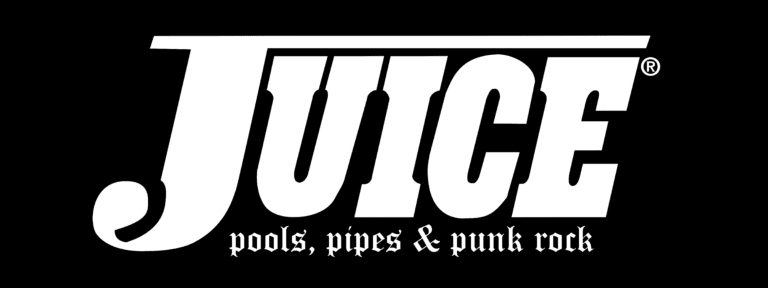


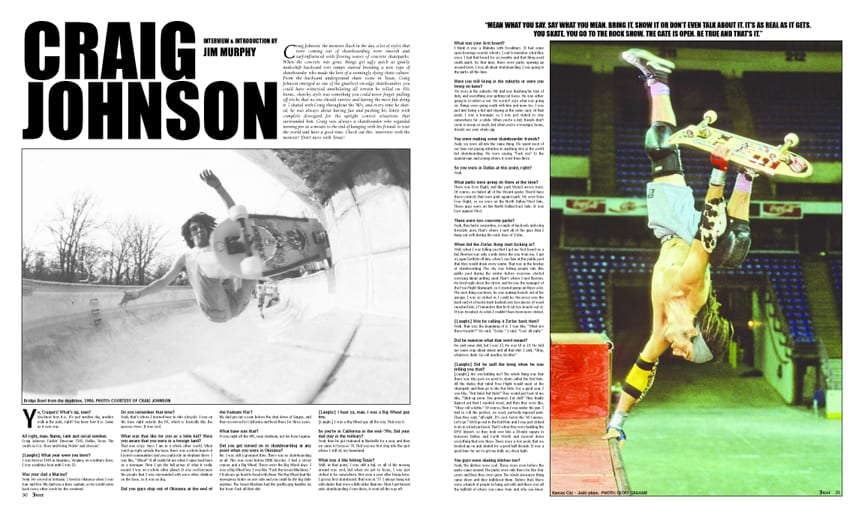
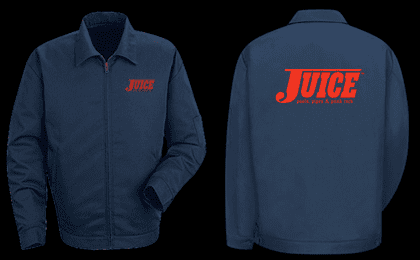
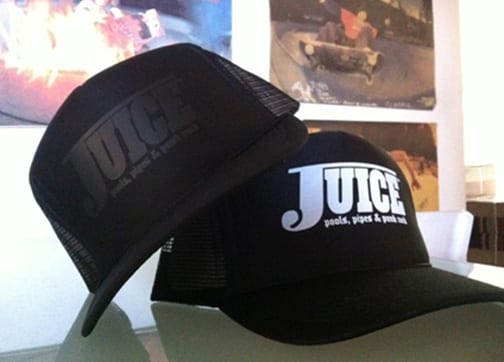





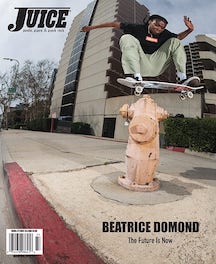
One Response